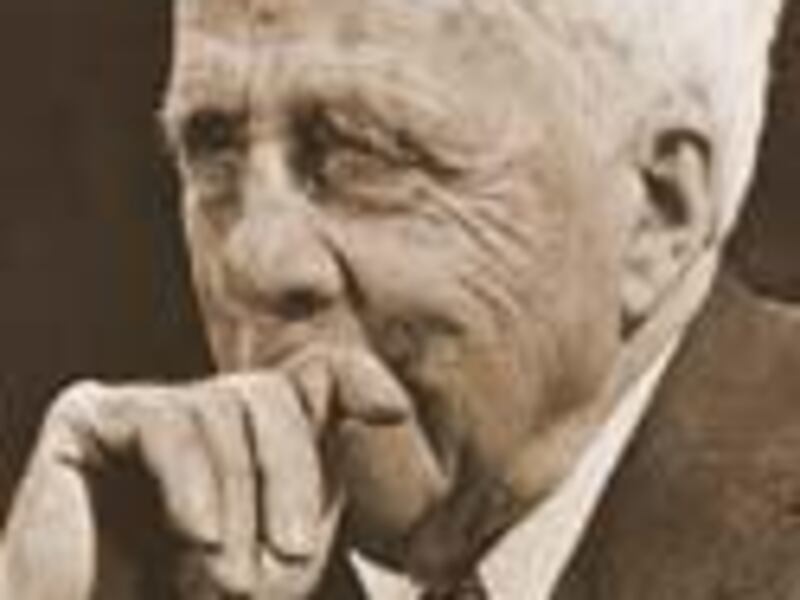Robert Lee Frost was the most popular American poet of his time and is recognized today as one of America's leading 20th-century poets. He won the Pulitzer Prize for poetry four times, and in 1960 Congress awarded him a gold medal "in recognition of his poetry, which has enriched the culture of the United States and the philosophy of the world." He was invited to recite his poem "The Gift Outright" at President John F. Kennedy's inauguration.
Frost was born in San Francisco on March 26, 1874. After his father died in 1885, the family left California and settled in Massachusetts. He completed high school in Massachusetts and attended less than one semester at Dartmouth College in New Hampshire. He also attended Harvard but received no degree.
In the early 1890s, Robert Frost worked as a farmer, an editor and a schoolteacher. It was during this time that he found themes for many of his most famous poems. His first professional poem, "My Butterfly," was published on Nov. 8, 1894, in The Independent, a New York newspaper.
In1895 he married Elinor Miriam White, who was a major inspiration for his poetry until her death in 1938. The couple moved to England in 1912 after their New Hampshire farm failed. While in England, Frost established a friendship with the poet Ezra Pound, who helped to promote and publish his work.
The Frosts returned to the United States in 1915 and landed in New York City two days after the United States publication of his first American book, "North of Boston." Sales of that book and another enabled Frost to buy another farm in New Hampshire. His reputation was well established by the 1920s, and he became the most celebrated poet in America. With each new book, including "New Hampshire" (1923), "A Further Range" (1936), "Steeple Bush" (1947), and "In the Clearing" (1962), his fame and honors increased.
| |
Though Frost's work is principally associated with the life and landscape of New England, his poetry is particularly identified with Vermont and New Hampshire. He found inspiration for many of his finest poems in the region's folkways, landscapes and mannerisms. His poetry is noted for its plain language, conventional poetic forms and graceful style.
Frost is often praised for being a direct and straightforward writer, though he cannot always be read easily due to his beliefs about people and nature. The romantic poets of the 1800s believed people could live in harmony with nature. To Frost, the purposes of people and nature are never the same, so nature's meanings can never be known. He felt that probing for nature's secrets was futile and foolish and that humanity's best chance for serenity would not come from understanding the natural environment.
Robert Frost displays many moods in his poetry. He assumes the role of philosopher in "Mending Wall," and in "Bereft," he responds to terror. He writes of vaguely threatening aspects of life in "Stopping by Woods on a Snowy Evening" and in "The Hill Wife," Frost shows the loneliness of a rural existence driving a person insane. His writings are diverse, yet often have common characteristics.
Robert Frost left a national legacy through his writing. He lived and taught for many years in Massachusetts and Vermont and died on Jan. 29, 1963, in Boston.
Resources: www.poets.org/poets; www.robertfrost.org; World Book Encyclopedia

